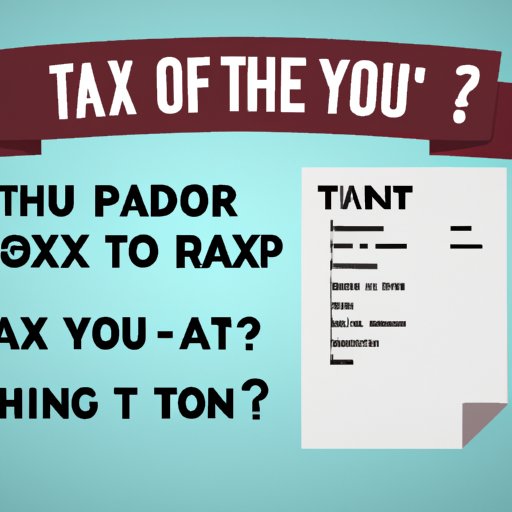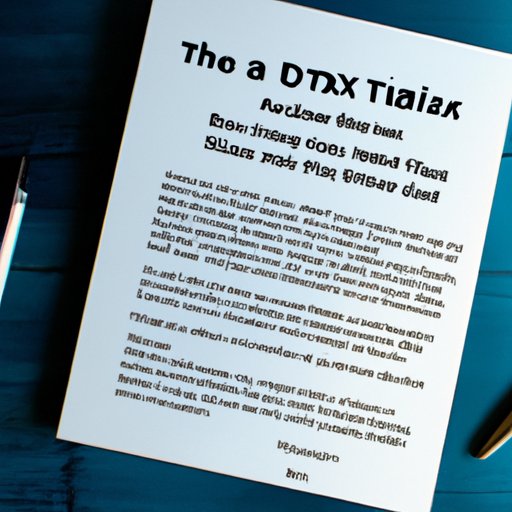Introduction
As a small business owner, you have a responsibility to yourself and your business to understand the taxes that you are obligated to pay. This article will provide an overview of when to start paying taxes for small businesses, along with detailed information on how to determine when you should begin paying taxes, what you need to know about the timing of filing taxes, and tips for understanding tax payment requirements.

How to Determine When Your Small Business Should Start Paying Taxes
Before you can determine when you should begin paying taxes, it’s important to understand your tax obligations. Depending on the type of business structure you choose, you may be subject to different types of taxes, and you may be required to file and pay taxes at different times throughout the year. You’ll also want to be aware of any commonly overlooked tax requirements, and make sure you stay up-to-date on any tax changes that may affect you.

A Guide to Understanding Tax Obligations for Small Business Owners
As a small business owner, you may be responsible for a variety of taxes, including federal income taxes, state income taxes, self-employment taxes, payroll taxes, and sales taxes. The types of taxes that apply to your business will depend on the type of business entity you choose, as well as your location. It’s important to note that there are some common tax requirements that are often overlooked, such as registering for a Federal Employer Identification Number (FEIN) or filing estimated taxes quarterly.
Tax laws and regulations are constantly changing, so it’s important to stay up-to-date on any updates that may affect your business. You can do this by subscribing to IRS email alerts, attending local seminars, or hiring a professional accountant to help you manage your taxes.
What You Need to Know About the Timing of Filing Taxes for Your Small Business
The timing of filing taxes is one of the most important aspects of managing your taxes as a small business owner. Generally, businesses must file and pay taxes by April 15th of each year. However, depending on the type of business entity you choose, you may be required to file taxes more frequently, such as quarterly or monthly. It’s important to know when you’re required to file taxes in order to avoid penalties and interest charges for late payments.
Filing taxes late can have serious consequences for your business, including hefty fines and fees, and even potential criminal charges. In order to avoid missing tax deadlines, it’s important to set reminders for yourself and plan ahead. You may also want to consider hiring a professional accountant to help you stay organized and ensure that your taxes are filed accurately and on time.

A Comprehensive Look at When Small Businesses Must Begin Paying Taxes
In general, small businesses must begin paying taxes when they start earning taxable income. Taxable income is any money earned from selling goods or services, or from investments. Taxable earnings must be reported to the IRS and the appropriate taxes must be paid. Depending on the type of business entity you choose, you may be required to pay taxes on a regular basis, such as quarterly or annually. Additionally, you may be required to make estimated tax payments if you expect to owe more than $1,000 in taxes for the year.
It’s important to understand the amount of taxes you owe and how often you need to make payments in order to avoid penalties and interest charges. You should also keep track of your tax payments to ensure that you are compliant with all applicable laws and regulations.
Tips for Understanding Tax Payment Requirements for Small Businesses
To ensure that you understand the tax payment requirements for your small business, it’s important to estimate the amount of taxes you owe each year. You can do this by calculating your expected taxable income and subtracting any credits or deductions you qualify for. Once you have determined the amount of taxes you owe, you can create a payment schedule to ensure that you make all of your tax payments on time.
It’s also important to keep track of your tax payments to ensure that you are compliant with all applicable laws and regulations. You can do this by keeping a record of all payments and receipts, as well as any documents related to your tax returns. If you’re ever unsure about the tax payment requirements for your business, it’s best to seek professional advice from an experienced accountant.
Conclusion
Understanding when to start paying taxes for small businesses is essential for any business owner. This article has provided an overview of when to start paying taxes, as well as detailed information on how to determine when you should begin paying taxes, what you need to know about the timing of filing taxes, and tips for understanding tax payment requirements. By understanding your tax obligations and planning ahead, you can ensure that you remain compliant with all applicable laws and regulations.
If you need additional information or assistance, there are a number of resources available to help small business owners understand their tax obligations, including the IRS website and local seminars. Additionally, you may want to consider hiring a professional accountant to help you manage your taxes.
(Note: Is this article not meeting your expectations? Do you have knowledge or insights to share? Unlock new opportunities and expand your reach by joining our authors team. Click Registration to join us and share your expertise with our readers.)
